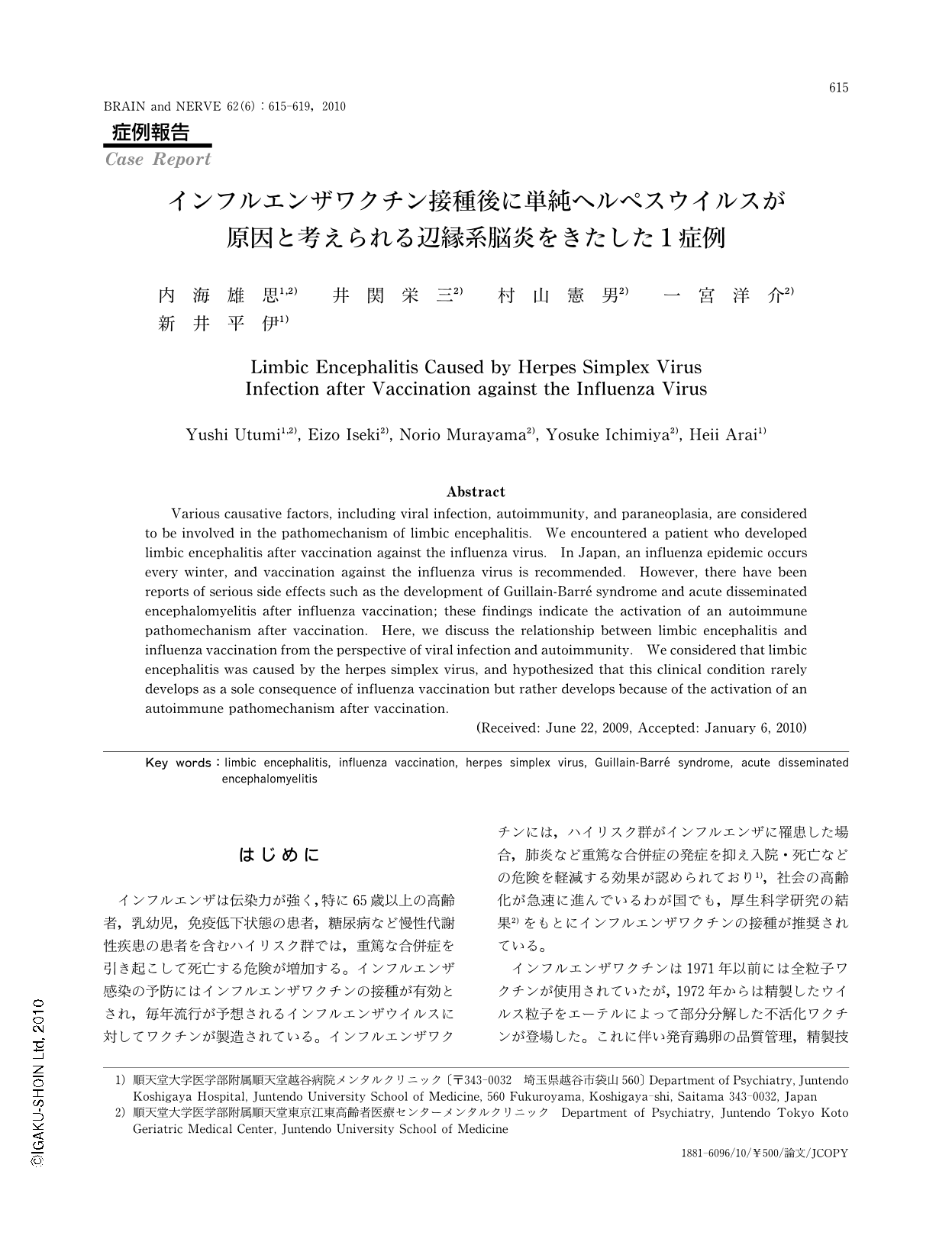はじめに インフルエンザは伝染力が強く,特に65歳以上の高齢者,乳幼児,免疫低下状態の患者,糖尿病など慢性代謝性疾患の患者を含むハイリスク群では,重篤な合併症を引き起こして死亡する危険が増加する。インフルエンザ感染の予防にはインフルエンザワクチンの接種が有効とされ,毎年流行が予想されるインフルエンザウイルスに対してワクチンが製造されている。インフルエンザワクチンには,ハイリスク群がインフルエンザに罹患した場合,肺炎など重篤な合併症の発症を抑え入院・死亡などの危険を軽減する効果が認められており1),社会の高齢化が急速に進んでいるわが国でも,厚生科学研究の結果2)をもとにインフルエンザワクチンの接種が推奨されている。 インフルエンザワクチンは1971年以前には全粒子ワクチンが使用されていたが,1972年からは精製したウイルス粒子をエーテルによって部分分解した不活化ワクチンが登場した。これに伴い発育鶏卵の品質管理,精製技術の改良や発熱物質の除去などの技術的進歩によって,発熱や神経系の副作用は大幅に減少した。しかしながら,極めて稀ではあるが,Guillain-Barre症候群(Guillain-Barre syndrome:GBS)やacute disseminated encephalomyelitis(ADEM)など自己免疫機序が推定される脳神経障害を生じて後遺症を残す例も報告されている3,4)。 今回われわれは,インフルエンザワクチン接種後に単純ヘルペスウイルスによると考えられる辺縁系脳炎をきたした症例を経験した。インフルエンザワクチン接種後に生ずる脳神経障害は重篤な後遺症を残しかねず,最悪の場合死に至ることもある。これらを未然に防ぐためにも,インフルエンザワクチン接種後の副作用の発症機序を個々の症例ごとに検討することは重要である。
2 0 0 0 OA コロナ禍の職務ストレッサーおよびコーピング方略 ──全国インターネット調査の第2報──
- 著者
- 市倉 加奈子 日野 亜弥子 田上 明日香 井村 里穂 石田 陽菜 深瀬 裕子 村山 憲男 村瀬 華子 島津 明人 平井 啓 田ヶ谷 浩邦
- 出版者
- 公益社団法人 日本心理学会
- 雑誌
- 心理学研究 (ISSN:00215236)
- 巻号頁・発行日
- pp.94.21046, (Released:2023-02-01)
- 参考文献数
- 39
Workplace changes, such as remote work during the COVID-19 pandemic, have caused serious psychological distress for workers. The aim of this study was to examine job stressors and coping strategies among Japanese workers during the pandemic. The study was a qualitative methods approach using a web-based survey for Japanese workers in May 2020. We asked about job stressors and coping strategies with free text comments. We performed context analysis and categorized job stressors and coping strategies. Of the participants, 59.2 % suffered psychological stress from workplace changes during the pandemic. We identified 11 categories of job stressors including “work-life balance,” “lack of communication,” “overwork,” and “diminishing work role.” We also identified 16 categories of coping strategies including “distraction,” “dealing with work tasks,” “looking for ways to communicate,” “environmental coordination of work-at-home,” “online chatting,” and “psychological disengagement.” This study shows that Japanese workers tried many ways to manage their job stressors under the burden of the state of emergency. In the future, we should examine the association between coping strategies and psychological distress during the COVID-19 pandemic.
- 著者
- 村山 憲男
- 出版者
- ワールドプランニング
- 雑誌
- 老年精神医学雑誌 (ISSN:09156305)
- 巻号頁・発行日
- vol.31, no.6, pp.589-596, 2020-06
